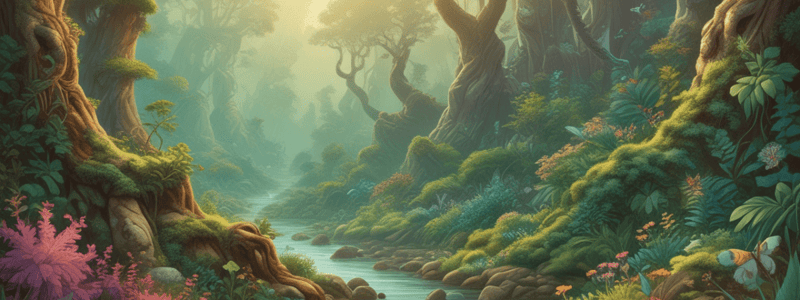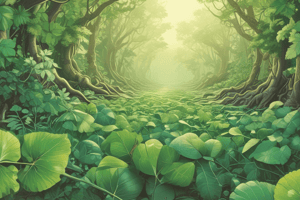Podcast
Questions and Answers
What is the study of the relationships between organisms and their environment?
What is the study of the relationships between organisms and their environment?
- Biochemistry
- Microbiology
- Ecology chanhe (correct)
- Genetics
What is the process by which cells generate energy from glucose? changr
What is the process by which cells generate energy from glucose? changr
- Respiration uodate (correct)
- Mitosis
- Photosynthesis
- Cell Division
What is the level of organization that refers to a group of individuals of the same species?
What is the level of organization that refers to a group of individuals of the same species?
- Population chabge (correct)
- Tissue
- Organ System
- Ecosystem
Flashcards are hidden until you start studying
Study Notes
Definition and Scope
- Biology is the scientific study of life and living organisms.
- It encompasses the structure, function, growth, evolution, distribution, and taxonomy of all living things.
Branches of Biology
- Botany: study of plants
- Zoology: study of animals
- Microbiology: study of microorganisms
- Ecology: study of relationships between organisms and their environment
- Genetics: study of heredity and variation
- Biochemistry: study of chemical processes in living organisms
- Molecular Biology: study of biological molecules and their interactions
- Cell Biology: study of cell structure, function, and behavior
Levels of Organization
- Molecule: basic building blocks of life (e.g., DNA, proteins, carbohydrates)
- Cell: basic structural and functional unit of life
- Tissue: group of similar cells performing a specific function
- Organ: structure composed of two or more types of tissue
- Organ System: group of organs working together to perform a specific function
- Organism: individual living thing
- Population: group of individuals of the same species
- Ecosystem: community of populations and their environment
- Biosphere: global sum of all ecosystems
Biological Processes
- Photosynthesis: process by which plants convert light energy into chemical energy
- Respiration: process by which cells generate energy from glucose
- Cell Division: process by which cells reproduce and grow
- Mitosis: process of cell division resulting in two identical daughter cells
- Meiosis: process of cell division resulting in four non-identical daughter cells
- Homeostasis: process by which organisms maintain a stable internal environment
- Evolution: process of change in species over time through natural selection and genetic drift
Definition and Scope of Biology
- Biology is the scientific study of life and living organisms.
- It encompasses the structure, function, growth, evolution, distribution, and taxonomy of all living things.
Branches of Biology
- Botany is the study of plants.
- Zoology is the study of animals.
- Microbiology is the study of microorganisms.
- Ecology is the study of relationships between organisms and their environment.
- Genetics is the study of heredity and variation.
- Biochemistry is the study of chemical processes in living organisms.
- Molecular Biology is the study of biological molecules and their interactions.
- Cell Biology is the study of cell structure, function, and behavior.
Levels of Organization
- Molecules are the basic building blocks of life, including DNA, proteins, and carbohydrates.
- Cells are the basic structural and functional unit of life.
- Tissues are groups of similar cells performing a specific function.
- Organs are structures composed of two or more types of tissue.
- Organ Systems are groups of organs working together to perform a specific function.
- Organisms are individual living things.
- Populations are groups of individuals of the same species.
- Ecosystems are communities of populations and their environment.
- The Biosphere is the global sum of all ecosystems.
Biological Processes
- Photosynthesis is the process by which plants convert light energy into chemical energy.
- Respiration is the process by which cells generate energy from glucose.
- Cell Division is the process by which cells reproduce and grow.
- Mitosis is the process of cell division resulting in two identical daughter cells.
- Meiosis is the process of cell division resulting in four non-identical daughter cells.
- Homeostasis is the process by which organisms maintain a stable internal environment.
- Evolution is the process of change in species over time through natural selection and genetic drift.
Studying That Suits You
Use AI to generate personalized quizzes and flashcards to suit your learning preferences.




